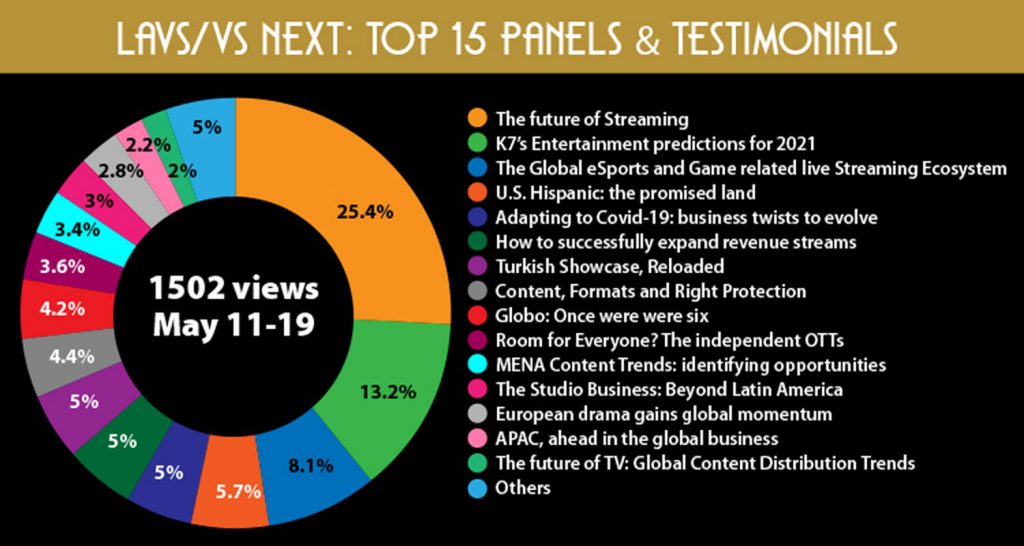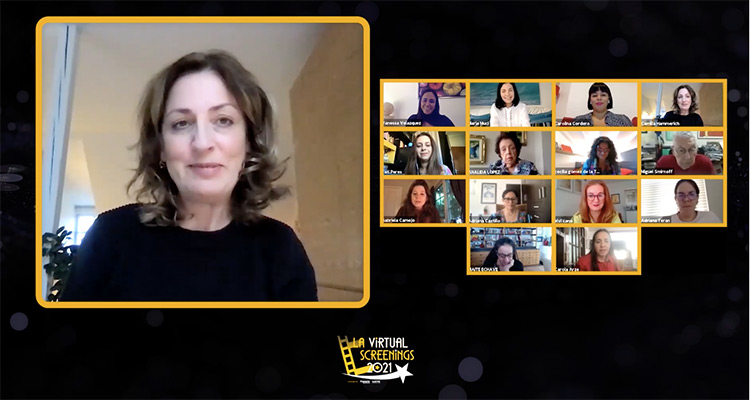
The last day of Conferences and Testimonials of the Industry at VS Next portion of LA Virtual Screenings closed with two key sessions: on one side, an in-deep analysis of the market top trends by global consultancy company 3Vision and, on the other, a warm conversation with The Killing and Borgen’ producer Camilla Hammerich, interviewed by WAWA board members.
Using the most recent data, Jack Davison, EVP 3Vision(UK) offered the company’s perspectives on current trends in content distribution, including studio D2C, broadcaster digital evolution and SVOD growth.The firm tracked an overview of the distribution market, where it showed 950 TV series, 320 different services, in 17 global markets, such as: USA, UK, Canada, China, Australia, Brazil, France, Germany, India, Italy, Japan, Mexico , Netherlands, Pan-Regional Asia, Poland, Spain, Sweden, among others.
Davisonhighlighted the digital distribution trend that ‘accelerated’ since last year, where many players emerged in the online space, where he mentioned platforms such as Streamz, iPlayer, Paramount +, HBO Max, Canal +, BritBox. ‘Otherwise, production continues to grow, and although a global pandemic slowed this down a bit, the number of new series has remained stable, and has already started to pick up again as some global markets re-establish’, he remarked.

He further added that both, in the USA and the UK, the production of scripted dramas remains resilient, reporting a slight percentage of decrease compared to 2019. While in terms of distribution, the sale of finished titles experienced a slight rebound in 2020; while the co-production model emerges as a new development trend in some markets such as the UK.
Meanwhile, he determined that streamers ‘continue to bet on local original content in the markets where it is available’.He also assured that even though in 2020, the streamers premiered fewer series and new seasons, the drop was not significant, highlighting that many productions have been premiered so far in 2021.In terms of distribution markets, USA scripted series had their premiere mainly on VOD platforms in Sweden, France and Italy, while in the UK, Spain, and Germany, there were more premieres on broadcasters.
As part of the first edition of «Inspiring Minds», the sessions dedicated to prominent female figures of the content industry organized by Worldwide Audiovisual Women Association(WAWA), VS Next published Camilla Hammerich’s interview.The executive producer at Nordisk Film Production (Denmark) who is the creator of the hit global series The Killing and Borgen.

Talking about her experience in the industry and the challenges of a woman behind the screen, she explained about her blockbusters: ‘We begin working on Borgen in 2008 with DR, Danish public television. At the time,we did not have a history of a female prime minister, in terms of inspiration.A relationship was created between the real-life in that government and what happened in the series, also influenced by Hillary Clinton and many European women who have been compared to the protagonist of the series Birgitte Nyborg. At the beginning, the series was not very popular, but it became important when flied abroad’.
‘We never thought that Borgen would travel the world. We did it for Denmark, for public television; later she was seen to be summarizing the rest of the world; We don’t know if she improves society, but she helps young women get inspired. The protagonist is neither good nor bad, she is a good person and she has a strong identity’, added Cammerich.
About the production she said:‘Several writers are women, and in particular the most difficult episode, which deals with the issue of prostitution, was written by a woman’. She also commented that the episodes were produced in blocks of two parts, with the same director and 15 days of filming each episode, with days of 9 to 10 hours per day; 80% of the filming, including the scenes in the government offices, was done inside the DR building and its own offices, with which only 20% were outdoors. There was a conceptualization director and ten directors, for the 30 episodes already made’, she remarked.
The executive concluded: ‘Television currently has a lot of competition raised by Netflix, but years ago it was essential to have good dramas on linear TV. Today, the market is diversified and democratized a little more. Denmark is a country with high taxes and there is the Danish Film Institute, which helps finance up to half the budget of 15 to 20 films per year, so it is already possible to bring more dramas to public screens or platforms’.

